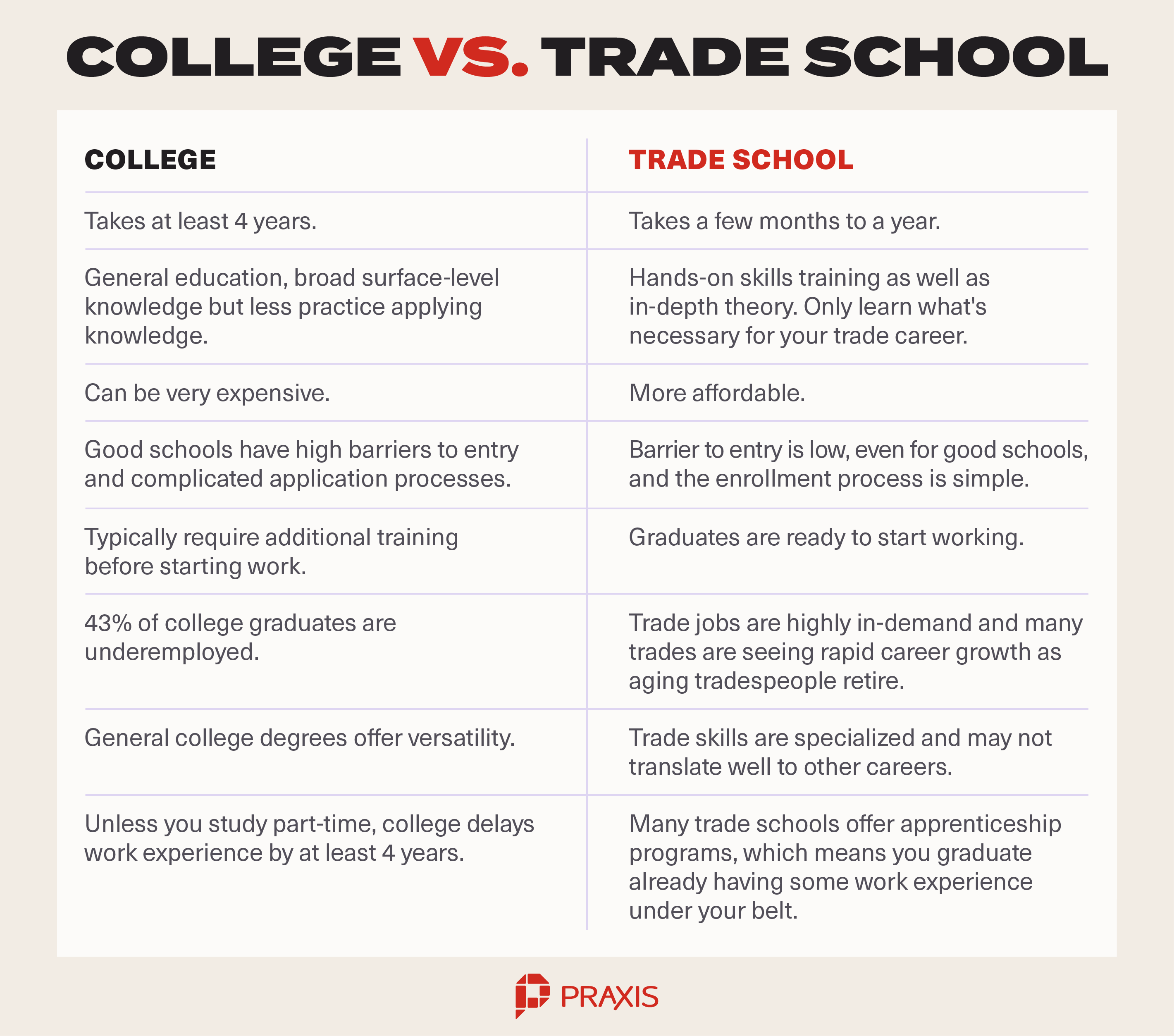If you’re nearing the end of high school, you’re probably facing questions like “Where are you going to college?” and “What are you going to study?” from family members, neighbors, teachers, guidance counselors, and friends.
That’s because, for a lot of people, going to college seems like the obvious choice. One of the main reasons people are so obsessed with sending young people to college is the belief that college leads to higher earning potential and better job prospects.
But the truth is, you don’t need a four-year college degree to get a great job and earn good money. A growing body of evidence is showing that for many students, college simply isn’t a good investment.
Sure, that might be true for some people, but we’ve already discussed the dangers of making life-changing decisions based on abstract aggregates that don’t take the individual into account in Why Go to College? Weigh the Payoffs Against the Downsides.
Here are some stats that show why college isn’t all it’s cracked up to be:
- According to Statista, 9.1 percent of recent graduates (2016-2020) are unemployed.
- Recent data put the graduate underemployment rate at 42.6 percent. That means nearly 43 percent of college graduates are working jobs that don’t require their level of education.
- Some 32 percent of graduates surveyed by Career Builder said they never found jobs in the field that they studied.
- In 2015, only 59 percent of students managed to graduate from 4-year degree programs within 6 years.
- The average student loan debt is $32,731 at 5.8 percent interest. Most college students estimate that they’ll pay off their debt in 6 years, but in reality, it takes an average of 20 years.
- And for all that, graduates lack key skills and aren’t ready for the workplace, according to 50 percent of employers.
- Meanwhile, 90 percent of surveyed human resources leaders are open to hiring candidates without a 4-year degree, and the top 25 percent of individuals with just high school out-earn the bottom 25 percent of 4-year-degree holders.
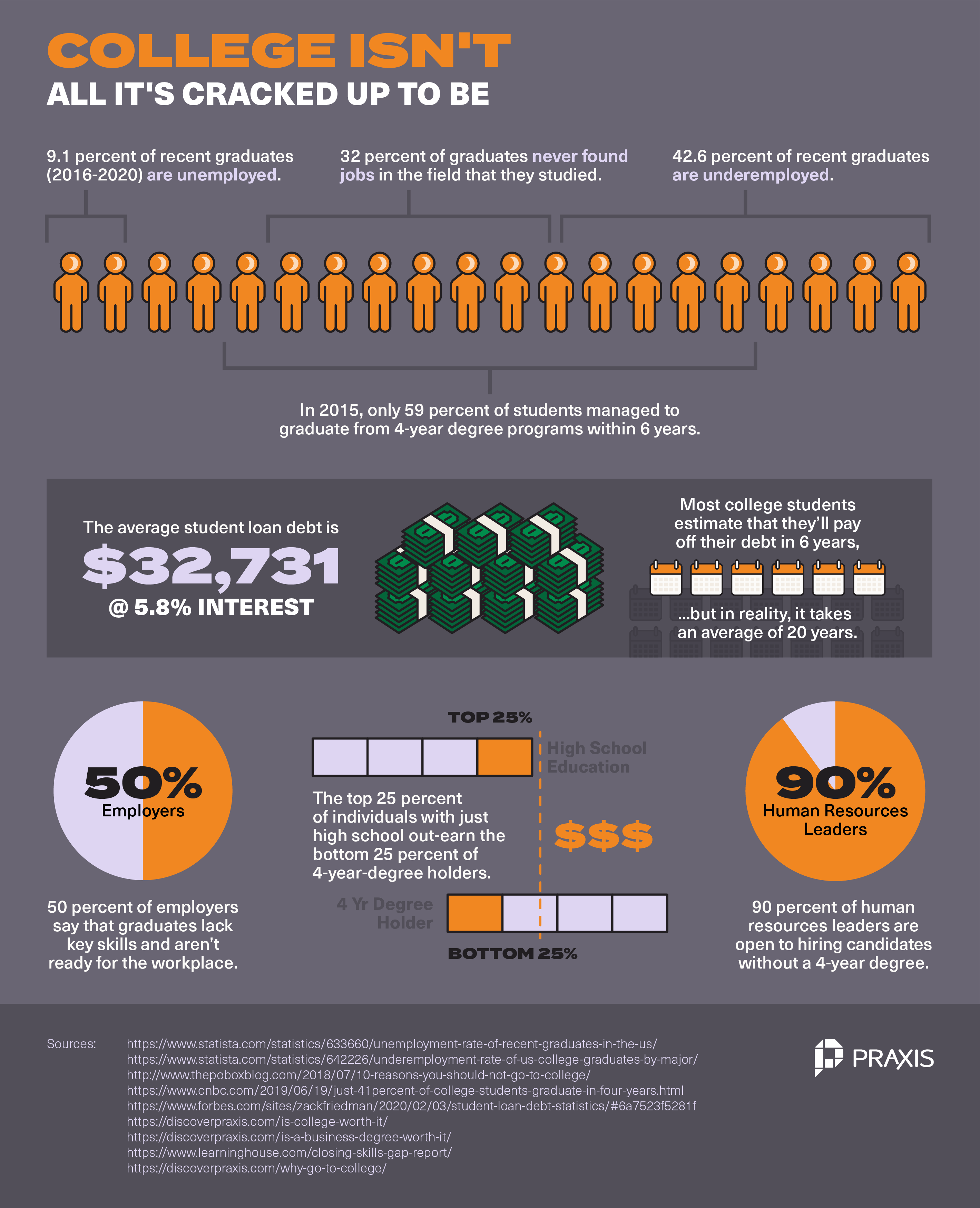
What About Trade Jobs?
Trade jobs include jobs like nurses, electricians, plumbers, HVAC technicians, welders, machinists, assemblers, carpenters, mechanics, auto body technicians, dental assistants, masons, and many more.
There’s a critical skills shortage in a growing number of trade jobs as skilled tradespeople retire and technological advances give rise to new skills requirements. According to Adecco, some 62 percent of firms are already struggling to fill key trade jobs.
What does this mean for you?
In a nutshell, it means that there’s a huge demand for driven young professionals who are willing to learn the skills of a trade. It also means that the hiring market in certain trades is highly competitive, which translates into higher wages, better benefits, and plenty of employer-funded training and certification opportunities.
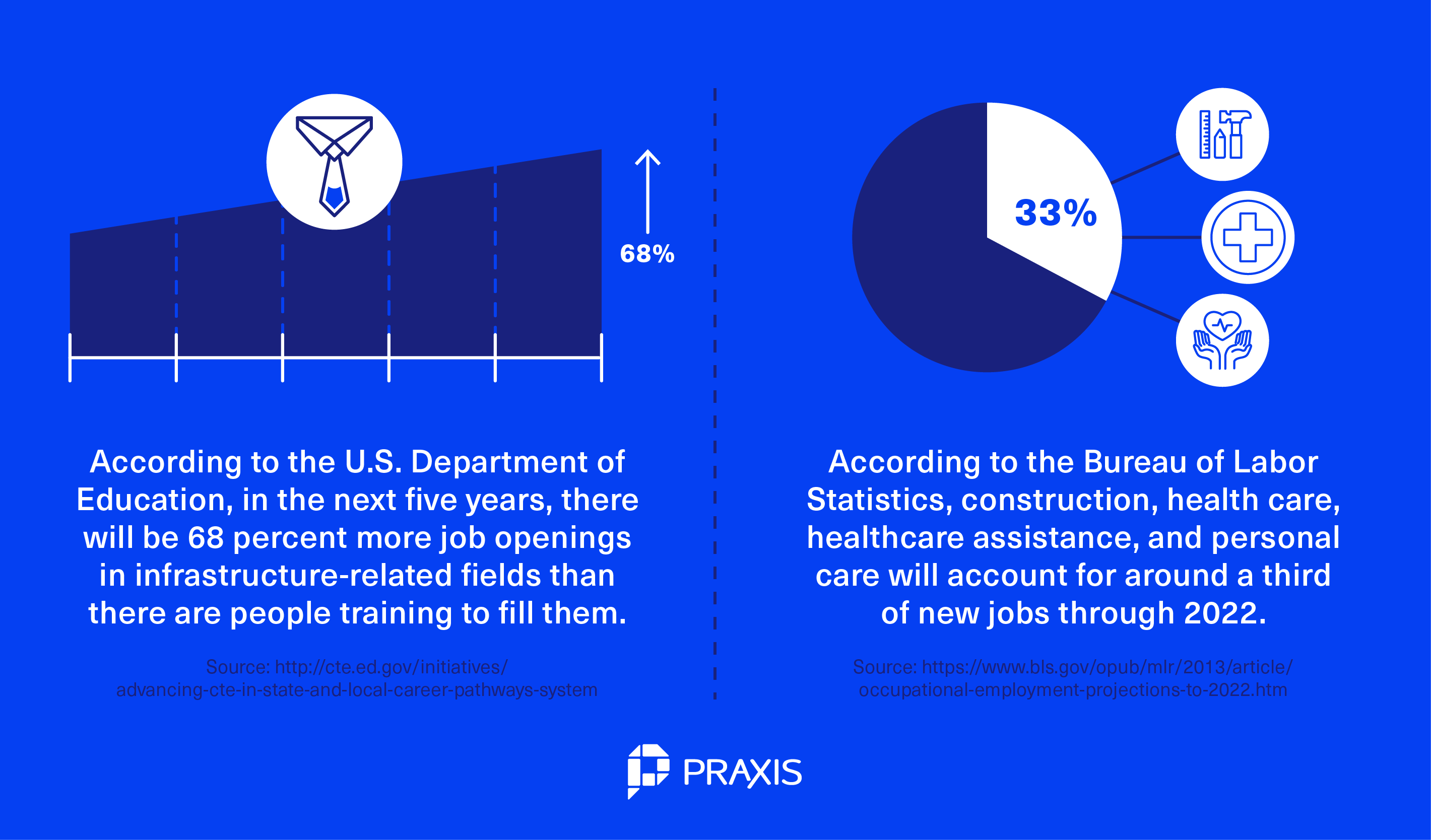
Keep in mind that location affects earning potential, as different trades see varying demand depending on which part of the country you’re looking at.
For example, according to the Bureau of Labor Statistics, the national average annual income for electricians is around $60,370. However, average incomes can vary significantly from state to state:
- California – $70,000
- Oregon – $75,000
- New York – $79,000
Unless you’re looking to move, it’s worth considering which trades have the best earning potential in your state before you start your training.
Trade School vs. College: What’s the Difference and Which Is Best for You?
Now you’re probably asking yourself whether college or trade school is the better option for you.
Honestly, you’re the only person who can answer this question, although resources like career counseling and aptitude tests may help you get a better sense of your strengths and make the decision easier.
While we can’t tell you what’s best for you, we believe that the more information you have, the better equipped you are to make the right choice. That’s why, below, we’ve compared some of the key considerations to take into account when deciding whether college or trade school is the best route for you.
Trade school might be a good fit for you if you like the thought of working with your hands in a high-paced environment, or if you’re someone who learns better by seeing and doing than by sitting in a classroom.
Keep reading for a detailed comparison of the differences between trade school and traditional college.
Duration
College:
Getting a Bachelor’s degree typically takes at least four years, which means most graduates only enter the workforce at the age of 22. That’s four years that you could have been gaining hands-on work experience and earning an income instead of sitting in a classroom. And that’s if you complete your program within four years, which only 41 percent of students do.
Trade School:
Trade school only takes a few months to two years, depending on the trade and program. This means you enter the workplace much sooner to start earning an income and gaining real-world experience.
Breadth of Education
College:
Four-year college programs teach a broad curriculum including general courses that won’t necessarily aid you in your career. At most colleges, you won’t have to choose a major until the end of your sophomore year, which means you’ll spend a lot of time (and credits – and money!) on courses you won’t end up pursuing.
Trade School:
Trade school focuses closely on the skills and knowledge you’ll need for your career and doesn’t require that you take general courses or extra credits. You only spend your time learning what you really need.
Cost of Tuition/Training
College:
College can be very expensive, with tuition, room and board, books, and other expenses ranging from around $10,000 per year to more than $50,000 per year. Recent research by the Idaho Department of Labor puts the cost of the average bachelor’s degree at around $127,000.
Trade School:
Trade school programs vary in cost depending on the institution, program, and location – but on the higher end of the spectrum, it costs around $33,000 all told. Due to the growing skills shortage in numerous trades, many employers are willing to sponsor or contribute towards apprentices’ training, and there are plenty of scholarship opportunities that end with job placement.
Barrier to Entry/Accessibility
College:
Getting into college can be a complex and daunting challenge due to stringent entry requirements and low acceptance rates. Applicants typically need to complete standardized tests, and scoring badly can significantly hamper your chances of acceptance. Applicants often wait weeks or even months before hearing back from four-year colleges.
Trade School:
Applying to and getting into trade school tends to be a straightforward process. Instead of a lengthy application process and prolonged waiting times, applicants can usually simply discuss their program choice with someone from the admissions team, schedule a campus tour, and select a start date. Most trade schools only require a high school diploma or equivalent.
Workplace Readiness Upon Graduation
College:
Sadly, after four long years of education, many college graduates find themselves woefully unprepared for the workplace. Research by the Pearson Business School found that only 13% of graduates are “ready to hit the ground running” upon entering the workforce, according to HR professionals.
Trade School:
Trade school graduates leave school with all the skills and foundational knowledge required to hit the ground running at their new trade job. They can later level up their skills or specialize further through additional certifications, which many employers are eager to sponsor.
Job Prospects/Security
College:
Despite the widespread belief that a college degree as much as guarantees a good job, the reality is that many graduates face unemployment and underemployment. A recent Cengage study found that while 93 percent of near-graduates believe that they’ll land a job relating to their field of study within six months of graduation, only some 60 percent actually do.
Trade School:
There is a huge demand for skilled tradespeople, with 62 percent of firms currently struggling to fill positions. And because they’re hands-on and typically require physical presence, trades jobs tend to offer high job security compared to other fields that can easily be outsourced internationally.
Work Experience Gained
College:
Full-time students lose (at least) four years of work experience, which can be a massive opportunity cost. Part-time students may gain some work experience, but the rigors of college may severely limit the kinds of opportunities they’re free to act on, which can significantly hamper their careers.
Trade School:
Trade school involves specialized hands-on training that is highly specific to your field, with much of this training taking place in workshops and other settings that closely resemble your future workplace. Through real-world projects, you’ll gain actual work experience that sets you up to start work with little to no additional on-the-job training required. Plus, because trade school programs are much shorter than traditional college, you’ll be able to start working and gaining work experience much sooner.
Praxis Vs. Trade School Vs. College
As we’ve discussed in depth elsewhere, college is not for everyone – and that’s okay. Not everyone is built to sit in lectures and take tests, spending thousands of dollars on an education that doesn’t guarantee a return on their investment.
If you’re a practical or technical person and enjoy working with your hands, trade school may be a good choice for you, with a shorter route to a paying job and good employment security.
But there’s another option.
If working with your hands and doing what can often be dirty jobs doesn’t appeal to you, fear not. There’s another alternative to college that doesn’t even require a high school diploma and guarantees to have you working full-time within six months – and earning an average of $50K in your first year!
Praxis is a college alternative that’s designed to help you find your feet in the workplace by helping you to build valuable skills like how to see projects through to fruition, how to sell products or services successfully, how to market your offering effectively, how to offer excellent customer service, and how to manage the day-to-day operations of a business.
These critical entrepreneurial skills are enormously useful, whether you’re dreaming of starting your own business or want to be a valuable – and hireable – addition to a team.
Here are some quick Praxis facts:
- Duration: 12 months. 6-month bootcamp + 6 months of on-the-job mentorship.
- Cost of tuition: $12,000. Don’t pay until you’re hired.
- Access requirement: No GED required. Must be self-driven, curious, and coachable.
- Our guarantee: Full-time job upon completion or it’s free. Average first-year income = $50K.
- Graduation rate: 93%
- Time commitment: 10-15 hours weekly, fully remote. You can do the bootcamp while holding down a job, so you don’t need to forego earnings.
In addition to honing your skills and helping you identify ways to match your talents to work you find interesting and rewarding, Praxis will help you build your portfolio (and confidence) through real-world projects that demonstrate your ability to create value. You’ll also gain a supportive network of other driven individuals and mentors to draw inspiration from.
Best of all? By the end of the 6-month bootcamp portion of the program, you’ll have a full-time job with a growing company. We guarantee it: If you don’t land a full-time job within 6 months of completing the bootcamp, you don’t pay a cent for Praxis.
Most young people don’t know this, but most professional “requirements” like degrees can be bypassed easily enough if you 1) do good work, and 2) know how to sell yourself. If you participate in the Praxis program, you’ll soon excel at both.
Below, we’ve put together a table so you can easily compare how Praxis measures up against trade school and college. We may be biased, but we know which choice we think offers the best return on your investment.
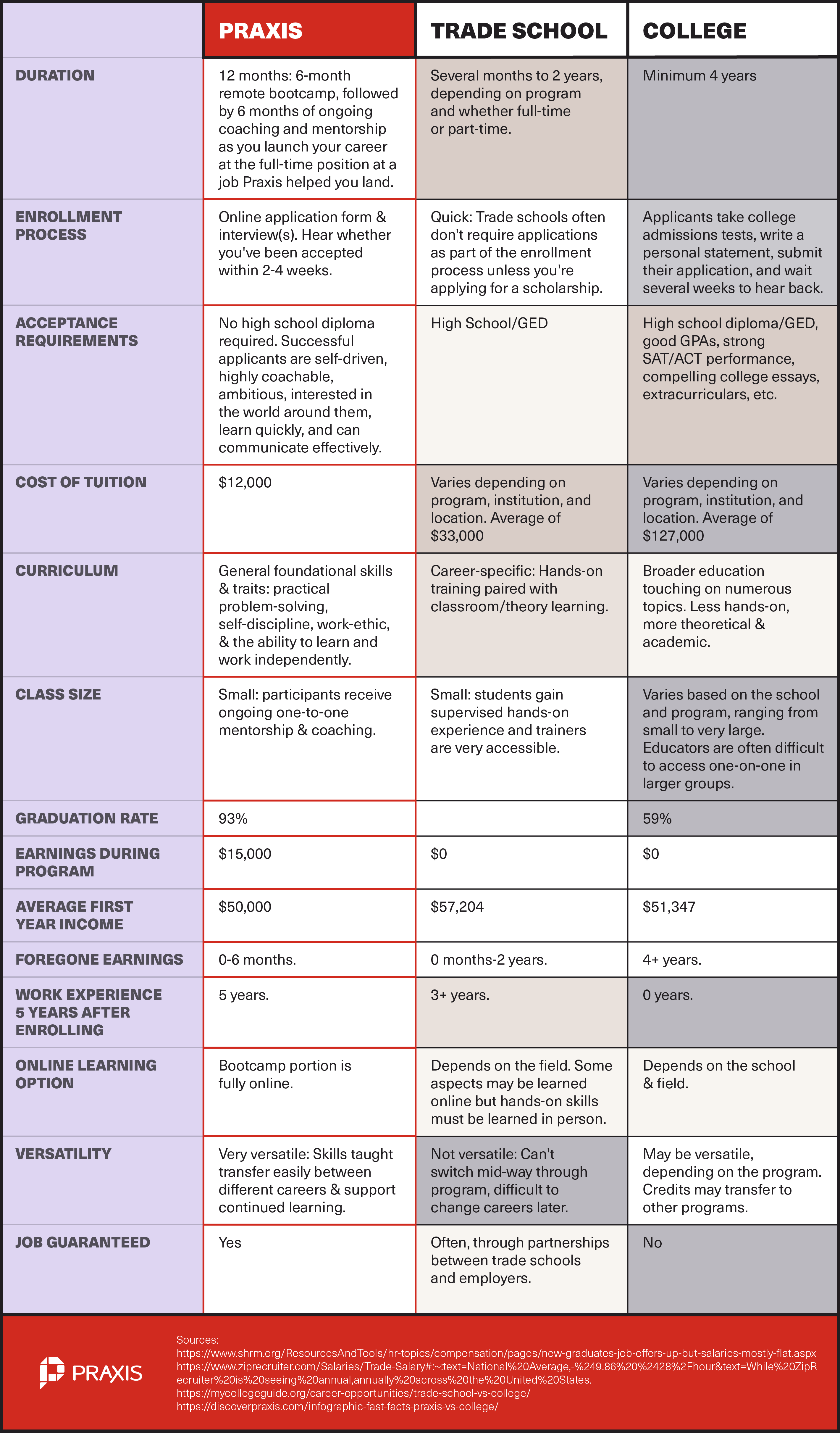
Want to know more? Explore why Praxis is the most direct route to a career you love. If you’re on the fence and need someone to discuss your career with, schedule a call – we’d love to talk to you about which option makes the most sense for you.
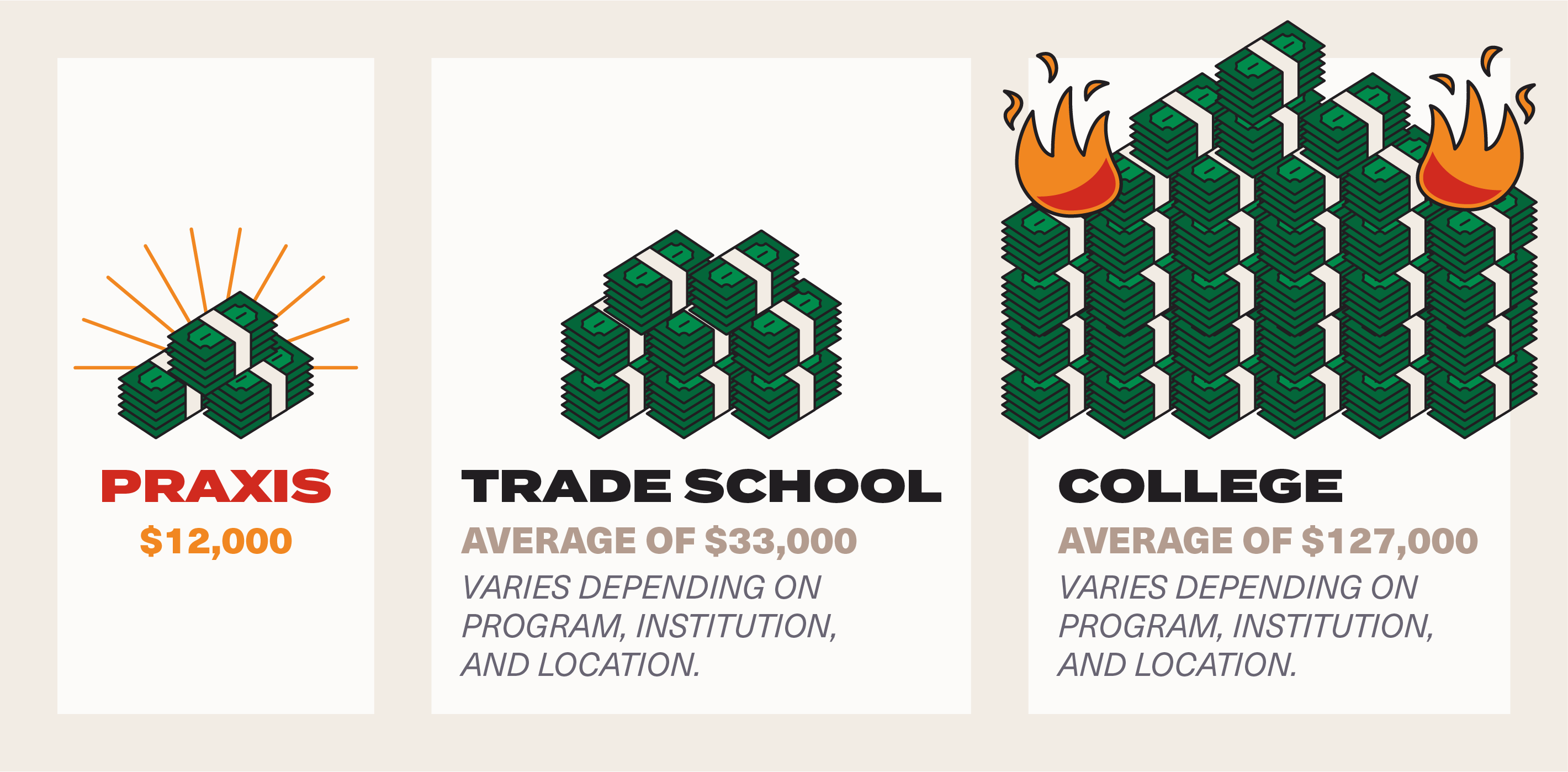
February 2, 2021
